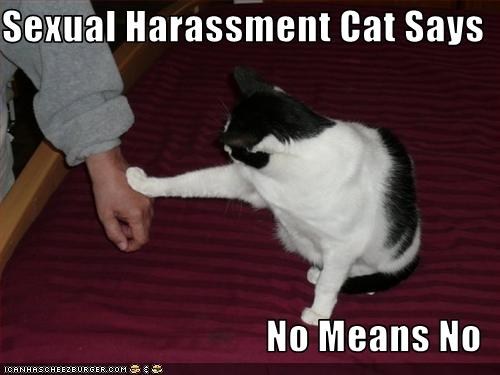8 Types Of Colleagues From Hell You May Have Faced And How To Deal With Them
"Oh you're going home already? But it's only 5pm."
We've all met bullies at schools. Then, we grow up, graduate, get jobs, and expect the bullying to end.
But more often than not, "bullying" and dealing with difficult people still happens at our workplaces – they just come in different forms.
1. The Micromanager who nitpicks at every. single. thing.
We all know the feeling of having a boss hover over our shoulders and check up on us every hour.
Psychology senior lecturer at a private university Dr. Eugene Tee explains that, "Micromanagers often have an excessive need to assert control or have a say in most, if not all major aspects of a particular task or assignment.
"This might stem from an: excessive need for control, an inability to trust employees, or the need to assert their competence to junior staff."
How to deal:
Have honest conversations with the person to help align the quality of both of your expectations, explains lecturer and counselling psychologist Justin Yap.
"If they must insist on nitpicking for the sake of it, have the quality conversation with your superior. Once you have your superior's trust, feel free to just ignore the nitpicker and say 'the boss has approved.'"
2. The Fake Colleague who wants to see you fail
Have you felt like your colleague was somehow out to get you or setting you up to look bad?
Fake colleagues are often quick to throw you under the bus, unlike a great colleague who understands that when one team player fails, it affects the whole team.
Tee describes them as someone who is "polite in person, but may act behind your back to downplay or discredit your accomplishments, and present you in a bad light to others."
How to deal:
"Haters gonna hate, hate, hate. Let your work speak for itself. [Take] the moral high ground. Do a hair toss every once in a while – you can be good at your job, and look great meeting all your sales targets," says Tee.
3. The Manipulator who makes you feel bad for standing up for yourself or giving an opinion
For example, "Chong" is not a team leader but whenever there is a task, he exerts dominance in meetings or in projects making it too intimidating for others to respond with opposing opinions.
Manipulative colleagues are great at showing the best sides of themselves to upper management, but tend to reveal their true colours to others.
How to deal:
Although easier said than done, it is important to stand up and give your opinion despite what they say.
"Others will know that you have something important to say, skills to contribute to your
team and/or organisation. Cosy up to important individuals in the company – but with an element that the manipulator does not have: authenticity," Tee shares with SAYS.
Yap suggests to cross-check your viewpoint with a fellow colleague to ensure that your points are legit. "You can also ask what others in the conversation think of your opinion, thereby putting further weight behind your words should they agree with you," he adds.
4. The Emotional Blackmailer who makes you feel bad for saying 'no'
Emotional blackmailers are a pain in the ass. Whether it's a facial expression or a snide remark they make, they never fail to make you feel guilty for saying 'no' to a task.
How to deal:
It's unrealistic to expect to please everyone.
Start by "[dissecting] every word the blackmailer uses to strong-arm you into saying yes and determine why it has such a hold on you," Yap advises.
Once you understand why, you will have a deeper understanding of yourself, making the blackmailing less effective, he adds.
5. The Backstabber who gossips about you
You thought you left the drama of teenage life behind you but backstabbers can still be found everywhere - gossiping in the pantry, during lunches, or in closed rooms.
Their toxic words can breed disunity in a team, especially when they've concocted information to paint their fellow colleagues in a bad light.
How to deal:
Confrontation may be tough but it is necessary in these situations.
"Initiate an honest conversation with your superior. Having the support of your boss can go a long way in putting backstabbers in their place," recommends Yap.
6. The Passive-Aggressive who makes you feel bad for leaving work at 5pm
"Wah, so efficient ah you today. Leaving work at 5pm!"
In many Asian workplaces, leaving on time can be difficult especially when you have a passive-aggressive manager or colleagues who make you feel guilty for it.
Instead of encouraging efficiency, they promote those who stay back late or give the illusion of working hard.
"Passive-aggressive colleagues are skilled at using thinly-veiled barbs that are meant to insult, offend and disparage – all with a smile," says Tee.
How to deal:
Yap reveals to SAYS that your "first step should be to identify the trigger words and determine why they have a hold on you."
"Once you're at peace with that, have honest conversations with your superior and get their blessings for leaving on time."
7. The Baggage Handler who constantly lets personal issues and emotions spill into work
It is normal to have issues outside of work that are difficult to control (ie. death of a family member, breakup, divorce etc). To some extent, it is impossible to leave 100% of your personal life at home.
"Usually spillover happens when the issues that they face are overwhelming their ability to cope, or when they lack sufficient resources to help them manage the situations they're in.
"It's not something that people enjoy doing (most of the time), and might be a cry for help in most cases," shares clinical psychologist Joel Low.
Unfortunately, spilling anger and frustration onto colleagues can potentially bring down the mood of a team or a whole department.
How to deal:
"Provide initial social support – be collegial, but be careful not to create a sense of
dependency with that colleague," advises Tee.
Yap says that, "[If] this individual is constantly letting emotions spill into work, you might want to consider gently pointing it out to them as they may not realise it themselves.
"Getting them professional help like therapy may go a long way in helping them deal with their issues, reducing the amount of spillage in the end."
8. The Dodgy One who makes you feel uncomfortable. Very uncomfortable.
Sexual harassment is still rampant in many offices today. Sometimes, they come from your bosses themselves.
How to deal:
Leave the company, bring it out into the open, or both. If the harassment is coming from your superior, go to the next highest person-in-charge.
"[Sounding] the alarm or whistleblowing can be risky, but know that you are taking direct steps to stop the company's culture from becoming worse," says Tee.








